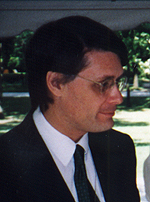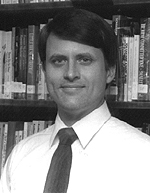



























|
September/October, 1998 Volume XIII Number 2

 Gilbert Meilander is Professor of Theology at Valparaiso University in Indiana. He holds a Ph.D. from Princeton University and has written extensively on religious ethics. He is the author of The Social and Ethical Thought of C.S. Lewis, Faith and Faithfulness: Basic Themes in Christian Ethics, and Bioethics: A primer for Christians.
Gilbert Meilander is Professor of Theology at Valparaiso University in Indiana. He holds a Ph.D. from Princeton University and has written extensively on religious ethics. He is the author of The Social and Ethical Thought of C.S. Lewis, Faith and Faithfulness: Basic Themes in Christian Ethics, and Bioethics: A primer for Christians.
The drive to have a child like me
Based upon the messages we hear from our culture, having children is an entitlement with few limits, according to Dr. Gilbert Meilander.
The drive to have a child is, of course, not new. Consider such biblical examples as Rachel who said to Jacob, "Give me children, or I'll die!" (Gen. 30:1), and Hannah and Elkanah who prayed fervently that God would send them a child (1 Sam. 1).
In light of advances in scientific knowledge and technology, more and more couples seek to have a child by participating in substitutionary processes that do not actually seek to correct a medical problem as much as they seek to bypass the problem. These include in vitro fertilization as well as various forms of surrogacy. Such processes fundamentally change the way a child is viewed.
In the story of Hannah and Elkanah, the child was seen as a gift from God, one which was to be returned to Him. But today the dynamics of reproduction involve "finding the child we want, instead of loving the child we have been given," according to Meilander.
The result of such a shift means that there is "designer child pressure," and the demand to abort those who are determined to be defective.
Additionally, even before a child enters the picture, what has typically been the most intimate and protected area of a couple's life is now infused with processes that involve what can only be described as a practical multiplicity of partners. Everyone from the physician who is informed about each conjugal act, to a multitude of technicians are engaged in the effort to produce a child.
Other than the invasion of medical specialist, surrogacy comes in different forms. It can involve a genetically related mother, one who is unable to carry her own child to term, thus three "parents," or it may not. It can involve five "parents" including a donor who supplies the egg, another who supplies sperm, a surrogate who carries the baby, and a couple planning to parent the child upon birth. The legal complications that are possible-some of which have been played out already-are phenomenal.
At its most basic level, without such surrogacy, artificial reproduction has ethical problems as couples are essentially asked to screen their embryos to determine how many they want and the future of those which are unused. The child has been reduced from a precious gift to a project which is vulnerable to the scrutiny and criticism of a multitude of others even before she makes her first appearance.
 Christopher Hook is a physician who specializes in medical oncology. He has been an active participant in ethical decision-making at the committee level and chaired the St. Luke's Hospital ethics committee for three years. At present he is Director of Ethics Education at Mayo Graduate School of Medicine and serves on the ethics committees of two other hospitals. He is a seasoned public speaker on end of life issues as well as other bioethical concerns.
Christopher Hook is a physician who specializes in medical oncology. He has been an active participant in ethical decision-making at the committee level and chaired the St. Luke's Hospital ethics committee for three years. At present he is Director of Ethics Education at Mayo Graduate School of Medicine and serves on the ethics committees of two other hospitals. He is a seasoned public speaker on end of life issues as well as other bioethical concerns.
Obligated to death?
Is there a situation in which people have a moral obligation not to live?
Dr. Christopher Hook held a pre-conference seminar with a number of bioethics students, over half of them practicing physicians there to attend the conference, and asked the audience to respond to the question just posed.
Protracted silence, frowns, and speech that came out in a halting fashion made it evident that medical professionals who participated genuinely struggled with the question. But their answers, from a biblical perspective, demonstrated how aggressively and sadly secular medical ethics dominates such discussions.
Seemingly without intending to, five who shared in answering the question presented the view that at times death has a higher value than living, even when the patient is not otherwise at risk of death. Being born with a significant handicap, suffering, or becoming a burden to others all tipped the scale in favor of an obligation toward non-existence.
None of those who answered the question actually dealt with the issue of an individual's "obligation," at least not consciously, until the issue of procreating a potentially handicapped child was raised.
Appearing hesitant to express his opinion before such an audience, one physician offered that a parents' inability to care for a child might obligate that parent to prevent the possibility of conception.
But if there were such an award, the prize for the most creative and spiritual sounding (though certainly not biblical) answer goes to a doctor who remarked that Christians who procreate defective children, particularly if such children are likely and can be avoided, are "poor ambassadors . . . in a world that views defects negatively." The ultimate sacrifice in contextualizing the gospel to make it relevant to one's neighbor, according to the logical extension of this thinking, is that the human sacrifice of one's children really can bring glory to God.
After just enough time for the audience to fairly express the range of views apparently commonly held by Christian physicians, Dr. Hook pointed out that responses were essentially in agreement with Linus Pauling who noted that persons carrying the cystic fibrosis gene should feel guilty for procreating, and Adolph Hitler who espoused the notion that those lacking a "whole body"-and today that can be detected at the genetic level-don't have the right to procreate.
All of these assumptions say that there is, in agreement with 19th and early 20th century eugenicists, something which can be identified as "wrongful life."
To compound the problem, in the last decade of the 20th century the identification of disease has shifted from what can be observed clinically, to what can be identified genetically (sub-clinically), to diseases which are only potential in that there can be a genetic predisposition which may or may not actually find expression in an individual's lifetime.
New gene technologies include somatic cell mutation where defective genes are replaced in enough cells so that the patient can reproduce a full and healthy segment on his own. Lacking at present is enough specificity-precision-to assure that only negative gene effects are impacted by such manipulation, and that all positive effects are still able to be properly expressed.
Germ line mutation is being developed at the gamete level-the unfertilized egg or sperm-so that it may be possible to design the child you've always wanted. The eugenic implications are frightening as the diversity that God has created is selected against in an effort to produce what only a relative few will determine can be labeled as "perfect" human beings.
While some argue that such technology will not be used to change "attributes," an attribute may eventually be redefined as a disease. For example, a woman's natural ability to become pregnant and reproduce offspring has always been considered a sex-related attribute. Only in the last 40 years has the very natural ability to become pregnant been redefined as a disease state.
In addition to the obvious eugenic possibilities and moral calamities attendant to our expanding reproductive technologies, there are the not so obvious ethical dilemmas over how the science may be applied to individuals. Will testing for certain diseases be obligatory? It is now for diseases like phenylketonuria (PKU), so who is to say that such testing will not expand?
And in the face of national testing, how is it that privacy will be maintained with regard to medical records? Already there is national legislation pending to require that every American be identified with a number that will correspond to his or her medical history.
Other issues of concern include the potential that genetic information might be disseminated among health insurers leaving many individuals without the ability to get insurance based on an analysis of what they might come down with in the future. Employment could be impacted by a potentially negative genetic profile as companies seek applicants with or without certain genetic predispositions. Social stigma too will arise, guaranteed, based upon one's vulnerability to traits.
Technology is hurtling toward us, and an object in motion is more difficult to control than one which is stationary. Unfortunately, in raising these questions now, as opposed to 40 and 50 years ago, the train has already left the station. It may be that God alone can check the rush of our advancing sciences.
 John Kilner is the Director of the Center for Bioethics and Human Dignity. He holds a PhD in religious ethics and has written numerous articles on issues surrounding medical ethics. He is the author of Life on the Line, a book which tests medical advances in light of the Christian world view. At present he is Professor of Bioethics at Trinity International University in Deerfield, Illinois, the nation's only Christian university with a fully accredited undergraduate and postgraduate program in bioethics.
John Kilner is the Director of the Center for Bioethics and Human Dignity. He holds a PhD in religious ethics and has written numerous articles on issues surrounding medical ethics. He is the author of Life on the Line, a book which tests medical advances in light of the Christian world view. At present he is Professor of Bioethics at Trinity International University in Deerfield, Illinois, the nation's only Christian university with a fully accredited undergraduate and postgraduate program in bioethics.
Cloning
According to Dr. John Kilner, there are three justifications which provide a foundation for cloning in today's society. These are utility, autonomy, and destiny.
Utility is based upon the idea that if something is useful or beneficial, then it ought to be pursued. With regard to cloning, such an ethic asks if it is beneficial to clone a sick child for organs, or even to replace a dead child altogether. Under utilitarianism, cloning human beings simply to produce organs for transplant or with the goal of creating a child without genetic defects may be meritorious.
Under the umbrella of autonomy, cloning is a private matter with society having responsibility to promote personal freedom. This would include providing technology and access to cloning as part of that commitment. Additionally, under autonomy-speak, society's responsibility is to enhance scientific inquiry, to boldly go where no man has gone before in order to add to scientific knowledge, even if it involves troubling research to create people as a mere consumer product.
Destiny, according to those in society like Richard Seed who has stated that he is able and willing to begin cloning human beings, involves a divinely given right to exercise control over human reproduction. "It is our destiny," his argument goes.
But Kilner advocates a much different approach. For him, to argue utility is to suggest in error that benefit can actually be quantified; that all of the liabilities of our technology can be known, even for generations to come. Additionally, utilitarianism allows that some people-clones-can be used to promote the needs of others without truly weighing their suffering, something which is contrary to biblical teaching.
Autonomy though probably weighs in as the most readily contra-biblical argument. Cloning, according to Kilner, is selfish, it is the literal expression of the Greek words auto (self) + nomos (law), where the individual becomes a law unto himself. As such, decisions are based upon what is good for the individual, regardless of the harm that extends to others and to society. As we have seen with abortion, there is no commitment to justice under a supreme right to autonomy.
Showing that a freedom-self-expression through cloning in this case-is curtailed is insufficient as an argument when placed alongside biblical demands for loving others, practicing justice and mercy, and doing unto others as you would have them do unto you. After all, Kilner asks, "Why do people want to have a clone, but they don't want to be a clone?" The answer is obvious in that there is competition for autonomy of the original to express itself as domination over the clone.
The argument of destiny posed by Seed and others marks a trend that must surely account for a silence in heaven as dramatic and fearful as the one which follows the opening of the seventh seal (Rev. 8:1). The trend is "for autonomy over God, not under God," according to Kilner. Such an argument means subordinating God's perspective to an assumed right to control not only our individual destiny, but the destiny of created others. And as with other arguments which posit that cloning humans is a "good," the argument of destiny ultimately resolves itself in using other people without their consent for one's own ends.
In the public arena, while there are arguments against cloning which ought to be made, the debate thus far has included little in the way of argumentation from a distinctly biblical world view. The situation is something that Kilner and the Center for Bioethics and Human Dignity are trying to remedy, but at the pace that technology is moving, and unless there is an outcry from the Church at large, their efforts soon may be too little, too late.
The Center's next annual bioethics conference is expected to revolve around how it is that Christians may implement change away from an ungodly endorsement of the trend toward cloning and other scientific malfeasance. If you are interested, you may contact the Center at 1-800-417-9999.
 Teresa Iglesias holds two doctoral degrees in philosophy. She has taught at Cambridge, as well as the University of Chicago. She is a University Philosopher and Medical Ethicist at University College, Dublin, Ireland. She is also the author of two books, Study in Euthanasia in Clinical Practice and IVF and Justice and has written numerous articles on issues of bioethical concerns.
Teresa Iglesias holds two doctoral degrees in philosophy. She has taught at Cambridge, as well as the University of Chicago. She is a University Philosopher and Medical Ethicist at University College, Dublin, Ireland. She is also the author of two books, Study in Euthanasia in Clinical Practice and IVF and Justice and has written numerous articles on issues of bioethical concerns.
Married couples and "donor" material
Is it ethically acceptable for a married couple to obtain generative cells from donors in order to obtain a child?
Since 1990 it is estimated that 30,000 humans are conceived annually through artificial means, many of them even created at the behest of Christian couples who are anxious to have a child. While many of those conceptions die or are cryogenically preserved, a significant number are successfully implanted in a womb and are born. In part because of the availability of donor eggs and sperm, a large number of these babies can be said to have more than two parents, and some as many as four if both sperm and egg are donated.
The donor system has itself become something of an industry. Medical school students are among the most frequently paid for generating a supply of gametes. According to Dr. Teresa Iglesias, one student boasted that he was able to continue paying for his medical education by way of such "donations." To purchase an ova-the female egg-in England costs somewhere around $3,000. All of this has turned the "donor" concept upside down and into quite a lucrative business for those who acquire and sell such reproductive material.
More often than not, donors are anonymous, allowing that a single man could, potentially, father 30 to 50 thousand children without ever having to take responsibility for one of them. He may be related as a co-parent to as many women as there are children produced by use of his sperm. The practical result, Iglesias says, is that many children already growing up today having no real biological history. At a time when society is promoting ethnic diversity and cultural connectedness, so much so that children often are not allowed to be adopted across racial lines, these children have had their story about who they are taken away from them. Nobody knows how they will adjust to being descended through a sterile biological process rather than directly connected with parents and grandparents, aunts and uncles, and even genetic brothers and sisters. To argue that they will not have questions and strong emotions concerning their origin is to deny the evidence of simple adoption where adult who were adopted as children have long reported wondering throughout their lives who their biological parents really are.
In fact, Dr. Iglesias argues that anonymity is generally required since responsibility for consequences must be eliminated from the transaction, but that such transactions have already produced children who are ill with diseases for which treatment may only be possible through identifying and contacting a genetic parent. Take for example a child who desperately needs a bone marrow transplant. Such a treatment all but requires genetic relatedness in order to have any hope of quickly finding a good match. Most of us might take for granted that we have relatives who could be tested almost immediately in a crisis, but for these children there is no guarantee.
That raises another dilemma, a legal problem because sooner or later one of these children will succeed in breaking the code of silence. A court will order that the donor be identified, and arguably he or she will be viewed differently as a result of having acted with chilling scientific objectivity to create a baby without taking responsibility for her. Anonymity is merely an illusion anyway since somebody always has access to donor records.
Children then are not the only ones to become dehumanized in the donor process. To the clinical team, the male or female donor's body becomes merely an object of research and a source for materials. Anecdotal tales of parents overjoyed at becoming parents aside, from a broader cultural perspective they are degraded as well in a process that reduces them to bodily functions which work or do not.
Technological regeneration is not "assisted," as it is labeled, rather it is, according to Iglesias, destructive. It requires the disintegration and reorganization of nature.
True fertility is a matter between two people, not three or four. The addition of a donor violates the marriage union so that what is being constructed is not only a new view of children who are to be available when they are wanted and disposed of when they are not. Such reorganization also results in a new view of how couples are to understand each other. Ultimately the invitation to bring a donor into the procreative process dehumanizes the parents, and in the process the marriage itself is being reorganized along new lines.
 Nigel Cameron received his Ph.D. from the University of Edinburgh, Scotland. He is founding editor of The European Journal of Theology and a contributing editor for Christianity Today. He has written and edited a number of articles and books including The New Medicine: Life and Death After Hippocrates, and has frequently been sought out for interviews on ethical issues by CNN, USA TODAY, and other media outlets. At present Dr. Cameron is Senior Vice President for University Affairs at Trinity International University. He is also associated with the former Simon Greenleaf University, now Trinity Law School based in California.
Nigel Cameron received his Ph.D. from the University of Edinburgh, Scotland. He is founding editor of The European Journal of Theology and a contributing editor for Christianity Today. He has written and edited a number of articles and books including The New Medicine: Life and Death After Hippocrates, and has frequently been sought out for interviews on ethical issues by CNN, USA TODAY, and other media outlets. At present Dr. Cameron is Senior Vice President for University Affairs at Trinity International University. He is also associated with the former Simon Greenleaf University, now Trinity Law School based in California.
Separating sex and reproduction
Nigel Cameron talks slowly, thoughtfully, with a heavy British accent, not unusual for a man who hails from England and spent academic years earning two degrees in Scotland. He was awarded a Ph.D. based upon his dissertation on the authority of Scripture, and its appeal to him is evident in his presentations.
The appeal of Scripture stands as the foundation to his concern with 20th century culture's divorce between sex and reproduction. This century has brought about human techniques, either chemically or through observation of the calendar, which have placed regular reproduction in the background of human experience. Sexuality has transitioned from holding a certain mystery and risk to being seen as mere recreation.
Add to that the spread of reproductive technologies that allow for life to begin in a laboratory instead of the usual progress of intercourse, fertilization in situ, implantation and growth. The ideal which involves the natural biological process of reproduction, has given way to determination. But Cameron states that "those outside of the ideal will be the first to admit-if they aren't politicized-that there are a number of problems they encounter as a result of these [reproductive] choices."
IVF technology is merely a form of "adoption" constituting what he calls "the rescue of a broken relationship, not the ideal."
Still, for Cameron, the subject of 20th century reproductive ills is only a symptom of a shift in medicine which goes much deeper. His book, The New Medicine is worth reading if you are interested in understanding something of what has held Western medicine together, bringing about improvements for centuries, and what it is that has contributed toward medicines incredible moral decline in recent decades.
The Oath of Hippocrates, rarely used in medical schools today unless it is in some vaguely reminiscent form, holds the key to understanding how it is that doctors were once viewed with high regard as healers. Today they have become simply consumer conscious providers.
Accountability spelled out in the Oath has been vacated, Cameron argues, and the commitment to do no harm has become a commitment to act with ill-defined integrity. In the minds of practitioners, that integrity now demands that patients be encouraged toward questionable or evil practices such as routine amniocentesis, abortion, and now assisted suicide.
 Randy Alcorn, ThM, has taught at Western Seminary and Multnomah Bible College, in Portland Oregon. In 1997 he researched and wrote a booklet on the abortifacient effects of the "pill." He is the founder and director of Eternal Perspectives Ministry and publishes a quarterly newsletter which discusses moral/ethical dilemmas. His website, which contains the text of his booklet and other fine articles he has written, can be accessed through Life Advocate magazine's links page.
Randy Alcorn, ThM, has taught at Western Seminary and Multnomah Bible College, in Portland Oregon. In 1997 he researched and wrote a booklet on the abortifacient effects of the "pill." He is the founder and director of Eternal Perspectives Ministry and publishes a quarterly newsletter which discusses moral/ethical dilemmas. His website, which contains the text of his booklet and other fine articles he has written, can be accessed through Life Advocate magazine's links page.
"Birth control" abortions and the problem of informed consent
Talking to physicians and seminary students about the abortion-effect of birth control pills has a certain element of risk, just ask Randy Alcorn.
Alcorn participated in a pre-conference panel at Trinity University.
One of the less heated, perhaps more honest responses came from a student who reacted with fear that without the pill, babies would be "popping out all over."
At the close of the panel session attendees elected to stay and talk, and two were downright furious.
Describing herself as a "women's advocate," Jeannie French-founder and director of the National Women's Coalition for Life-balked at the idea that women might be "made to feel guilty" if they were given information about the abortion effects of the pill.
Her voice raised in strained protest, she insisted that women using hormonal birth control simply could not weigh the evidence and make a good decision without feeling ambivalent, perhaps even remorseful over abortions that may have occurred prior to their having the information. (French endorses informed consent for women having a surgical abortion though.)
A physician assailed Alcorn for not having what he considered to be enough information on the precise numbers of abortions occurring with the pill. Without more precision in calculating the numbers, he argued, any lives lost are simply irrelevant. (If we can only estimate the death rate, it is as if the unfortunate dead do not exist at all.) Alcorn responded that his full presentation the following day would provide much of the data the doctor was looking for. Suggesting that ignorance truly is bliss, the physician elected not to attend the full session.
On day two of the conference, Randy Alcorn was joined by Dr. Walt Larimore for a more extensive discussion of the evidence. In a rapid-fire presentation, both speakers presented an analysis of the considerable medical writings describing abortion-effects surrounding the pill. Larimore did a systematic review of the literature-thousands of articles-finding 32 that presented specific and significant data to demonstrate that the pill always works in three ways, one of those involving the eventual spontaneous abortion of a baby unable to implant in the mother's womb. Three credible research articles provides a normal standard when offering data, so 32 articles should have raised concerns among the most skeptical in any scholarly audience.
Dr. Larimore's research included analysis of the ectopic pregnancy rate among pill users and non-users. Pill users have double the rate of ectopic pregnancy, the reverse of what would be expected if the pill was truly preventing conception. Citing the American Journal of Obstetrics and Gynecology, and other sources, Dr. Larimore demonstrated that the evidence for a consistent and significant abortion effect is unquestionable.
Both Alcorn and Larimore stressed the need for sharing fully with patients who are being counseled on questions of birth control. Even with the expansive right to abortion-the denigration of humans prior to birth-there are many women who would elect to forego use of the pill if informed consent, informing the patient of the risk of abortion, was required upon prescribing hormonal birth control.
In a society that insists upon autonomy and equality for women, access to this type of information is critical. The medical community arguably demonstrates nothing other than a condescending attitude toward women by refusing to fully disclose the available data.
According to Alcorn, the consequences of believing the pill causes abortions are that we view abortion statistics differently, adding literally millions more to the unborn death toll. It serves our interests to see the pill as safe, a product that does not cause abortion.
However, studies uncovered by Larimore and the testimony of drug company research cited by Alcorn make such a conclusion impossible. Potentially millions of women would refuse to take the pill if they understood that such "family planning" means that they are quietly aborting, killing their own offspring, children every bit as real as babies whose bodies are surgically destroyed in abortion facilities throughout the country.
 Dr. Walt Larimore is a family practice physician with faculty appointments at the University of South Florida School of Medicine, Duke University, and the University of Florida. He is the host of an American Health Network show, Ask the Family Doctor," as well as a weekly 3 hour radio call-in show. He serves on the Physician's Resource Council for Focus on the Family, and has written more than 150 articles in the medical literature.
Dr. Walt Larimore is a family practice physician with faculty appointments at the University of South Florida School of Medicine, Duke University, and the University of Florida. He is the host of an American Health Network show, Ask the Family Doctor," as well as a weekly 3 hour radio call-in show. He serves on the Physician's Resource Council for Focus on the Family, and has written more than 150 articles in the medical literature.
OTHER
COVER
STORY
ARTICLES
Brave new world technology
Sidebar Articles

© 1997 Advocates for Life Ministries
|
|
 Gilbert Meilander is Professor of Theology at Valparaiso University in Indiana. He holds a Ph.D. from Princeton University and has written extensively on religious ethics. He is the author of The Social and Ethical Thought of C.S. Lewis, Faith and Faithfulness: Basic Themes in Christian Ethics, and Bioethics: A primer for Christians.
Gilbert Meilander is Professor of Theology at Valparaiso University in Indiana. He holds a Ph.D. from Princeton University and has written extensively on religious ethics. He is the author of The Social and Ethical Thought of C.S. Lewis, Faith and Faithfulness: Basic Themes in Christian Ethics, and Bioethics: A primer for Christians.
 Christopher Hook is a physician who specializes in medical oncology. He has been an active participant in ethical decision-making at the committee level and chaired the St. Luke's Hospital ethics committee for three years. At present he is Director of Ethics Education at Mayo Graduate School of Medicine and serves on the ethics committees of two other hospitals. He is a seasoned public speaker on end of life issues as well as other bioethical concerns.
Christopher Hook is a physician who specializes in medical oncology. He has been an active participant in ethical decision-making at the committee level and chaired the St. Luke's Hospital ethics committee for three years. At present he is Director of Ethics Education at Mayo Graduate School of Medicine and serves on the ethics committees of two other hospitals. He is a seasoned public speaker on end of life issues as well as other bioethical concerns. John Kilner is the Director of the Center for Bioethics and Human Dignity. He holds a PhD in religious ethics and has written numerous articles on issues surrounding medical ethics. He is the author of Life on the Line, a book which tests medical advances in light of the Christian world view. At present he is Professor of Bioethics at Trinity International University in Deerfield, Illinois, the nation's only Christian university with a fully accredited undergraduate and postgraduate program in bioethics.
John Kilner is the Director of the Center for Bioethics and Human Dignity. He holds a PhD in religious ethics and has written numerous articles on issues surrounding medical ethics. He is the author of Life on the Line, a book which tests medical advances in light of the Christian world view. At present he is Professor of Bioethics at Trinity International University in Deerfield, Illinois, the nation's only Christian university with a fully accredited undergraduate and postgraduate program in bioethics.
 Teresa Iglesias holds two doctoral degrees in philosophy. She has taught at Cambridge, as well as the University of Chicago. She is a University Philosopher and Medical Ethicist at University College, Dublin, Ireland. She is also the author of two books, Study in Euthanasia in Clinical Practice and IVF and Justice and has written numerous articles on issues of bioethical concerns.
Teresa Iglesias holds two doctoral degrees in philosophy. She has taught at Cambridge, as well as the University of Chicago. She is a University Philosopher and Medical Ethicist at University College, Dublin, Ireland. She is also the author of two books, Study in Euthanasia in Clinical Practice and IVF and Justice and has written numerous articles on issues of bioethical concerns. Nigel Cameron received his Ph.D. from the University of Edinburgh, Scotland. He is founding editor of The European Journal of Theology and a contributing editor for Christianity Today. He has written and edited a number of articles and books including The New Medicine: Life and Death After Hippocrates, and has frequently been sought out for interviews on ethical issues by CNN, USA TODAY, and other media outlets. At present Dr. Cameron is Senior Vice President for University Affairs at Trinity International University. He is also associated with the former Simon Greenleaf University, now Trinity Law School based in California.
Nigel Cameron received his Ph.D. from the University of Edinburgh, Scotland. He is founding editor of The European Journal of Theology and a contributing editor for Christianity Today. He has written and edited a number of articles and books including The New Medicine: Life and Death After Hippocrates, and has frequently been sought out for interviews on ethical issues by CNN, USA TODAY, and other media outlets. At present Dr. Cameron is Senior Vice President for University Affairs at Trinity International University. He is also associated with the former Simon Greenleaf University, now Trinity Law School based in California.
 Randy Alcorn, ThM, has taught at Western Seminary and Multnomah Bible College, in Portland Oregon. In 1997 he researched and wrote a booklet on the abortifacient effects of the "pill." He is the founder and director of Eternal Perspectives Ministry and publishes a quarterly newsletter which discusses moral/ethical dilemmas. His website, which contains the text of his booklet and other fine articles he has written, can be accessed through Life Advocate magazine's links page.
Randy Alcorn, ThM, has taught at Western Seminary and Multnomah Bible College, in Portland Oregon. In 1997 he researched and wrote a booklet on the abortifacient effects of the "pill." He is the founder and director of Eternal Perspectives Ministry and publishes a quarterly newsletter which discusses moral/ethical dilemmas. His website, which contains the text of his booklet and other fine articles he has written, can be accessed through Life Advocate magazine's links page.
 Dr. Walt Larimore is a family practice physician with faculty appointments at the University of South Florida School of Medicine, Duke University, and the University of Florida. He is the host of an American Health Network show, Ask the Family Doctor," as well as a weekly 3 hour radio call-in show. He serves on the Physician's Resource Council for Focus on the Family, and has written more than 150 articles in the medical literature.
Dr. Walt Larimore is a family practice physician with faculty appointments at the University of South Florida School of Medicine, Duke University, and the University of Florida. He is the host of an American Health Network show, Ask the Family Doctor," as well as a weekly 3 hour radio call-in show. He serves on the Physician's Resource Council for Focus on the Family, and has written more than 150 articles in the medical literature.